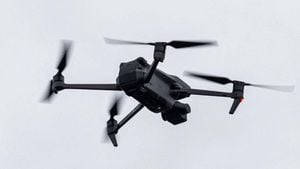With Donald Trump once again taking the reins of the White House, discussions surrounding his post-election foreign policy rapidly intensified, drawing the attention of leaders and analysts around the globe. The reactions were especially palpable from Europe, where anxieties around security commitments and international collaborations resurfaced.
German politicians, already bracing for changes, are particularly cautious. Will Trump, known for his harsh criticism of NATO allies, return to his previous stance and make demands for heightened military expenditures? Speculation looms, accompanied by the uncertainty of how relationships will shape up under his leadership.
German Foreign Minister Annalena Baerbock reached out to the new U.S. president, expressing aspirations for "partnership and friendship," but underlying her message was the plea for reliability during turbulent times. Amid this, Trump’s informality and unpredictability sparked unease among German politicians.
Typically, the U.S. has played the role of NATO’s stalwart supporter, committing vast resources and leading major operations. Yet, Trump's previous allegations about NATO members owing the U.S. "huge sums of money" for defense cast shadows on the future. This remark was underscored during his earlier tenure when he vehemently criticized Germany and others for falling short of NATO's two percent defense spending guideline.
Germany's Defense Minister Boris Pistorius quickly responded to Trump's election victory with call-to-action statements, urging European counterparts like France, Poland, the UK, and Italy to bolster defense budgets. "We Europeans have to do more for our own security," he stated, alluding to the pressing need for fair burden-sharing within the bloc.
Despite the call for increased spending, the political turbulence within Germany—leading to early elections scheduled for February 23—makes substantial commitments challenging. The country is still grappling with internal conflicts, which may compel it to prioritize financial stability over defense augmentations.
One notable trend is the increase of defense expenditure projected for the current year due to the undercurrents of insecurity following Russia's aggressive movements. For the first time, Germany's defense budget is poised to hit the NATO guideline of two percent of GDP, enabled largely through special funding directed at the Bundeswehr after the invasion of Ukraine. Yet, there's apprehension about maintaining this commitment long-term.
Critics of Trump’s approach to foreign policy fear the marketization of international relations, where only those who "pay" receive security guarantees. Former NATO chief strategist Stefanie Babst cautioned against this mentality, arguing it could breed discord and undermine the unity between NATO allies, particularly benefitting adversaries like Russian President Vladimir Putin.
Across the Atlantic, amid speculation of military aid, Trump's previous actions raised eyebrows when he failed to adequately support Ukraine against Russian aggression. Analysts predict potential reevaluation of military assistance as Trump indicated his lack of prioritization for Ukraine, causing European allies to rethink their strategies and reinforce their own capabilities.
Ulrike Franke, a security expert with the European Council on Foreign Relations, expressed concerns over Europe’s ability to independently compensate for any potential shortfall stemming from reduced U.S. contributions. While the financial means are available, the production of military hardware remains critically low.
Remarkably, Trump's statements deny the European nations the autonomy to dictate their military and security narratives, reinforcing fears of European dependence on U.S. military support. Underpinned by his previous claims, analysts argue this stance could lead to isolative tendencies among European countries, making collaboration increasingly difficult.
Trump himself has repeatedly discussed "negotiation" positions, indicating willingness to strike deals without European participation, eliciting wariness from those observing from Berlin and Brussels. Little wonder many see this as merely feeding the anxiety about what shaping global foreign policy can look like with Trump at the helm.
Deep-rooted is the belief among European leaders: if Trump's administration pursues Germany as the scapegoat for NATO funds, it would lead to significant diplomatic rifts. Directional changes induced by the U.S. could hinder coordination on pressing issues, such as Russia’s aggressive expansionism or climate crisis interventions, already complicated by Brexit dynamics.
Analysts like Thomas Kleine-Brockhoff opine on these dynamics, asserting the need for European nations to strengthen their own defense frameworks. They would benefit by forming collective groups to develop consensus on engagements with Ukraine to preempt potential unilateral moves from the U.S.
If Trump's term is marked by increased protectionism and transactional policies, European allies might find themselves at the mercy of shifting U.S. priorities, potentially jeopardizing both security and humanitarian efforts abroad, particularly as Ukraine wrestles with the continued ramifications of invasion.
Lessons from the first Trump administration dictate caution; underscoring the need for Europe to not only rally behind the NATO flag but to dig its heels firmly as the tectonic plates of international diplomacy realign under unconventional leadership.



